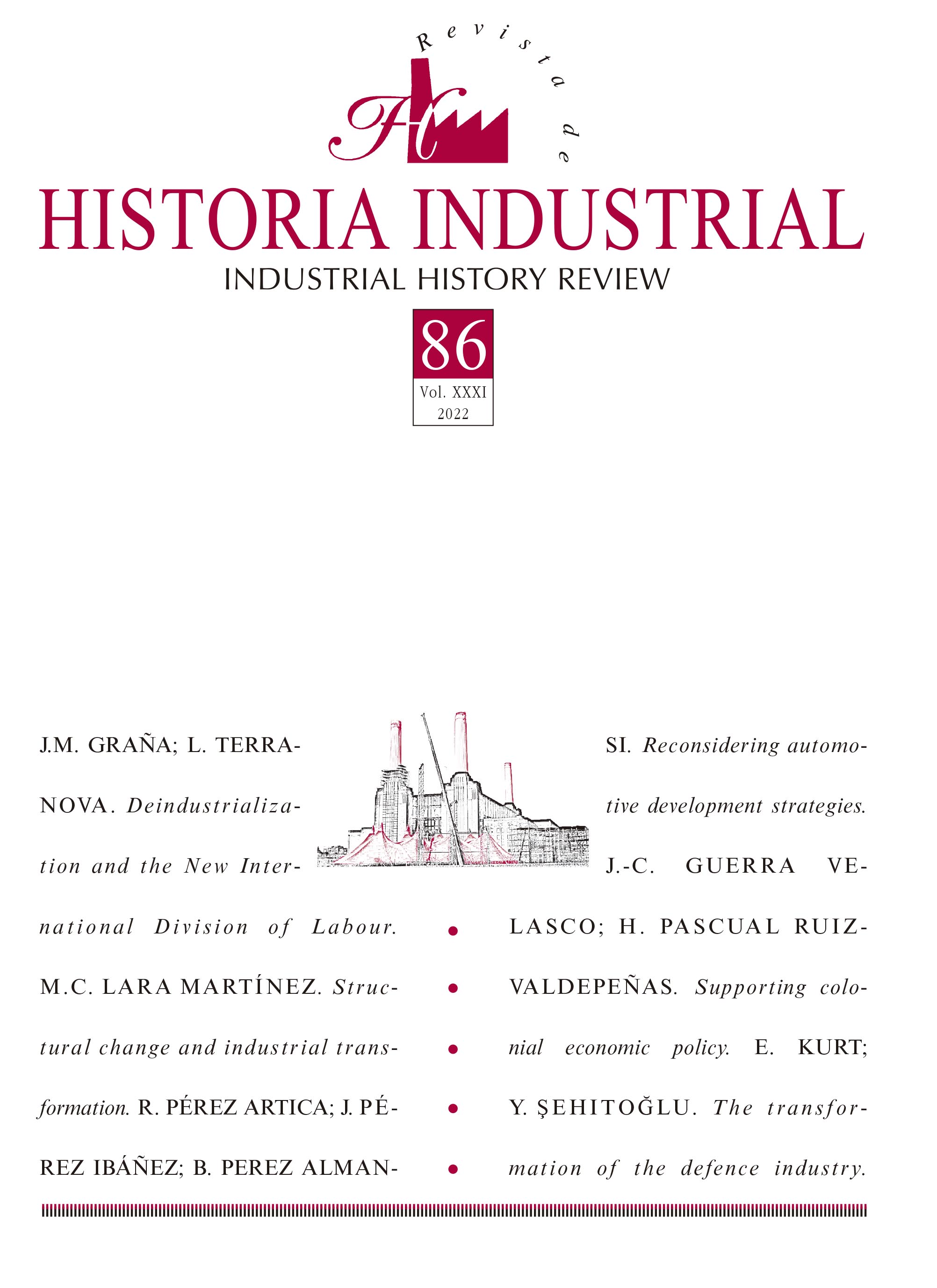Supporting colonial economic policy during early Francoism: The Peninsular Delegation of the Spanish Continental Guinea Wood Syndicate
DOI:
https://doi.org/10.1344/rhiihr.35782Keywords:
Equatorial Guinea, okuome, colonialism, Wood SyndicateAbstract
During Francoism, especially its autarkic stage, Spanish colonialism in equatorial Africa found a fundamental ally in the Spanish Continental Guinea Wood Syndicate and its Peninsular Delegation. From 1936, all of the colony’s forest concessionaires were obligated to join. More studies are needed to reflect the role certain institutions played in Spanish colonialism during this period. This paper contributes to filling this gap by studying the activity behind the work of the Peninsular Delegation – the sale of wood. It is argued that this trade was marked by an intention. It reveals the relations, understandings, distances and antagonisms woven around the colonial project and economy, while helping to understand the complex regulatory framework that the autarky applied to the use of colonial wood.
Downloads
References
Aparicio, Miguel. 1980. El sindicalismo vertical y la formación del Estado Franquista. Barcelona: Ediciones de la Universidad de Barcelona.
Bernal, Francisco. 2010. El sindicalismo vertical: burocracia, control laboral y representación de intereses en la España franquista (1946-1951). Madrid: Centro de Estudios Políticos y Constitucionales.
Butlin, Robin. 2009. Geographies of Empire. European Empires and Colonies c. 1880-1960. Cambridge: Cambridge University Press.
Carnero, Fernando, and Álvaro Díaz. 2009. ‘Guinea Ecuatorial en la estrategia autàrquica del franquismo’. Between three continents: rethinking Equatorial Guinea on the fortieth anniversary of its independence from Spain. Hotsfra University. https://www.hofstra.edu/pdf/community/culctr/culctr_guinea040209_delapaz.pdf [consulted May 12, 2021]
Carnero, Fernando, and Álvaro Díaz. 2014. ‘Aproximación a la economía de Guinea Ecuatorial en el período colonial’. Historia Contemporánea, 49: 707-734
Christopher, Anthony. 1984. Colonial Africa. Beckenham: Croom Helm.
Dargavel, John, and Elizabeth Johann, 2013. Science and hope. A forest history. Cambridge: The White Horse Press.
FAO. 1969. Mission d´Inventaire Forestier 20 juin-29 julliet 1969. Guinée Equatoriale. FAO library AN: 142577. FO: DP/EQG 70/001. Document de Travail. Rome: FAO.
García, Rafael. 2007. ‘La relación hispano-alemana en la época totalitaria (1939-1945)’. Iberoamericana, 7(26): 95-107.
Gómez, Antonio. 1997. ‘El fracaso de la autarquía: la política económica española y la posguerra mundial (1945-1959)’. Espacio, Tiempo y Forma. Serie V. Hª Contemporánea, 10: 297-313.
Guerra, Juan Carlos. 2019. ‘Ciencia forestal, práctica técnica, política de la madera y contexto colonial en Guinea Ecuatorial (1928-1968)’. Scripta Nova. Revista electrónica de Geografía y Ciencias Sociales, Vol. XXIII, nº 613.
Guerra, Juan Carlos, and Henar Pascual. 2015. ‘Dominando la colonia: cartografia forestal, negocio de la madera y apropiación del espacio en la antigua Guinea continental española’. Scripta Nova. Revista electrónica de Geografía y Ciencias Sociales, Vol. XIX, nº 525.
Guerra, Juan Carlos, and Henar Pascual. 2017. ‘La selva como argumento: imaginario geográfico, discurso forestal y espacio colonial en Guinea Ecuatorial (1901-1968)’. Cuadernos Geográficos, 56(I): 6-25.
Hopkins, Antony Gerald. 2019. An Economic History of West Africa. London: Routledge.
Lascasas, Santiago. 2010. Biografía del café. Zaragoza: Institución Fernando el Católico, Excma. Diputación de Zaragoza.
Laserre, Guy. 1955. ‘Okoumé et chantiers forestiers du Gabon’. Les Cahiers d’Outre-Mer. L. VIII: 119-160. 19461_RHI86_TRIPA.indb 140 14/11/22 13:29
Leitz, Christian. 1996. Economic Relations between Nazi Germany and Franco’s Spain. 1936-1945. Oxford: Clarendon Press.
Leitz, Christian. 1999. ‘La intervención de la Alemania Nazi en la Guerra Civil Española y la Fundación de HISMA/ROWAK. In La República asediada: hostilidad internacional y conflictos internos durante la Guerra Civil, edited by Paul Preston, 71-100. Madrid: Península.
Nájera, Fernando. 1930. La Guinea Española y su riqueza forestal: conferencia dada en el Instituto de Ingenieros Civiles el día 14 de diciembre de 1929. Madrid: Instituto Forestal de Investigaciones y Experiencias.
Pascual, Henar, and Juan Carlos Guerra. 2017. ‘Civilizando la selva: capital, espacio y negocio forestal en la antigua Guinea continental española, c. 1926-1936’. Revista Historia Agraria, 72: 135-166.
Sant, Jordi. 2009. ‘El modelo económico colonial y sus contradicciones: Fernando Poo (1900-1936)’. Afro-Hispanic Review. 28(2): 57-80.
Sant, Jordi. 2017. El comerç del cacau entre Barcelona i Fernando Poo: La Unión de Agricultores de la Guinea Española (1880-1941). Doctoral thesis. Barcelona: Universitat Pompeu Fabra.
Sant, Jordi. 2018. ‘El negocio del cacao: origen y evolución de la élite colonial de Fernando Poo (1800-1936)’. Ayer, Revista de Historia Contemporánea, 109: 137-168.
Santana, Teodoro. 2020. ‘La no beligerancia española y el bloqueo británico en el contexto canario’. XXIII Coloquio de Historia Canario-Americana.
Suárez, Sergio. 1997. ‘Las colonias españolas en África durante el primer franquismo (1939-1959). Algunas reflexiones’. Espacio, Tiempo y Forma. Serie V. Hª Contemporánea, t. 10: 315-331.
Toboso, Pilar. 2017. ‘Redes y grupos empresariales en el Sindicato Vertical franquista’. Ayer. Revista de Historia Contemporánea, 105 (1): 103-128.
Young, Crawford. 1984. The African Colonial State in Comparative Perspective. New Haven: Yale University Press.
Zapata, Santiago. 2001. ‘La madera en España (c. 1850 – c. 1950). Un primer esbozo’. Revista de Historia Económica, año XIX, 2: 287-343.
Downloads
Published
How to Cite
Issue
Section
License
Copyright (c) 2022 Revista de Historia Industrial — Industrial History Review

This work is licensed under a Creative Commons Attribution 4.0 International License.
The author assigns all rights to the publisher. Creative Commons
The author who publishes in this journal agrees to the following terms:
- The author assigns all intellectual property rights exclusively to the publisher for the entire duration of the applicable intellectual property rights.
- The publisher will distribute the texts under the Creative Commons Attribution License, which allows others to share the work, provided that they acknowledge the authorship, its initial publication in this journal, and the conditions of the license.





